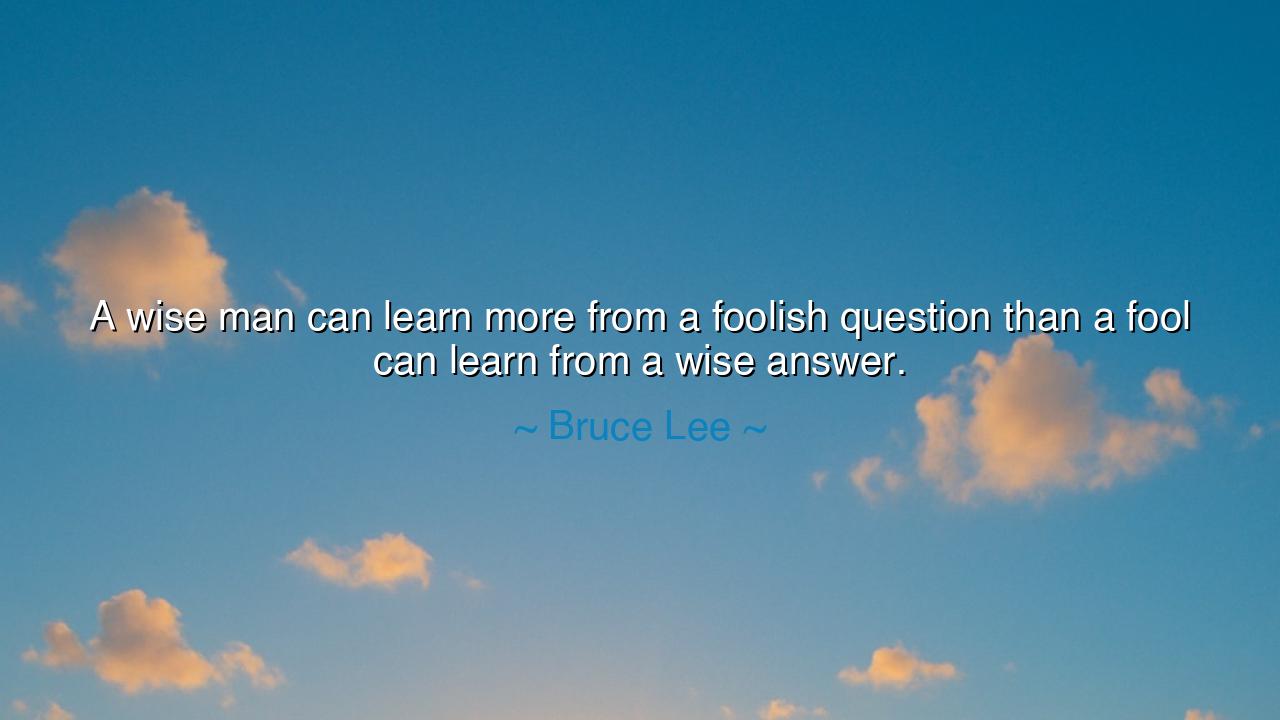
A wise man can learn more from a foolish question than a fool can
A wise man can learn more from a foolish question than a fool can learn from a wise answer.






“A wise man can learn more from a foolish question than a fool can learn from a wise answer.”
So spoke Bruce Lee, a master not only of motion but of mind — a philosopher who saw beyond the blade and the body into the hidden movements of truth. This saying, though simple in form, is a river of wisdom that runs deep through the valley of human understanding. In it lies the eternal contrast between wisdom and folly, between the one who seeks and the one who scorns, between the heart that listens and the mouth that only speaks. For it is not the question nor the answer that shapes the learner — it is the spirit of learning itself.
The wise man, in Bruce Lee’s teaching, is not wise because he knows all things. He is wise because he knows that he does not. He listens even when the voice before him is clumsy, mistaken, or absurd. He does not dismiss the foolish question, for he knows that truth often hides in strange garments. To him, every word, every doubt, every error, is a mirror through which he might see deeper into the workings of life. The fool, however, is blinded not by ignorance but by arrogance. When the wise answer is given to him, he hears only the echo of his own pride. And thus, the seed of knowledge, though sown, finds no soil in which to grow.
The origin of this quote springs from Bruce Lee’s lifelong journey of discipline, humility, and self-awareness. He studied not only martial arts but philosophy, psychology, and poetry. He observed how people, when filled with ego, shut the gates of the mind. He taught his students that a cup already full cannot be filled again. So he said, “Empty your cup.” Likewise, this saying teaches that the mind must be humble, open to learn even from the unlearned, for wisdom is not given to those who think they already possess it.
Consider the tale of Socrates, the ancient philosopher of Athens. He wandered the streets not to teach but to ask — to question the proud and the learned until they saw their own ignorance. To many, his questions seemed foolish, even irritating. Yet in those “foolish” questions lay the key to self-knowledge. Socrates knew, as Bruce Lee did centuries later, that a wise man learns through inquiry, while the fool mocks what he does not understand. In the end, Socrates’ humility led to enlightenment, while the arrogance of others led only to their confusion.
There is a deeper truth hidden here: every moment of life is a lesson in disguise. The wise learn from the simple, from the broken, from the unpolished. They observe the child and see honesty; they listen to the madman and hear pain; they look upon failure and find guidance. The fool, by contrast, sees only what flatters his ego. When offered counsel, he resists it; when offered truth, he argues it. Thus, he remains forever trapped in the prison of his own certainty.
In our own age — an age of noise and opinion — this lesson is more vital than ever. The wise man listens before he speaks; he questions before he judges; he learns before he teaches. The fool, drowning in his own noise, mistakes loudness for strength and stubbornness for wisdom. Yet knowledge does not shout — it whispers. It waits for those who are humble enough to hear it. Therefore, to live wisely is to become a lifelong student — never above correction, never beyond growth.
The lesson, then, is this: wisdom is a posture of the heart, not a measure of intellect. The one who seeks truth in all things — even in error — becomes unshakable. To follow this path, one must practice silence, curiosity, and humility. When someone asks a foolish question, do not laugh — listen. When someone gives a wise answer, do not debate — reflect. Ask not, “Is this worth my time?” but “What might this teach me?” For every word, every moment, every being is a teacher to those who have eyes to see.
So, my child of the future, when you walk among men, carry the heart of the wise man within you. Learn from all things — from the wise and from the foolish alike. Let no encounter pass without leaving you richer in understanding. For he who learns from all becomes greater than all; and he who despises the simple truths will stumble even over the obvious. Remember Bruce Lee’s timeless counsel: the foolish question may reveal more than the clever speech — if only you have the courage to listen with the ears of wisdom.






AAdministratorAdministrator
Welcome, honored guests. Please leave a comment, we will respond soon